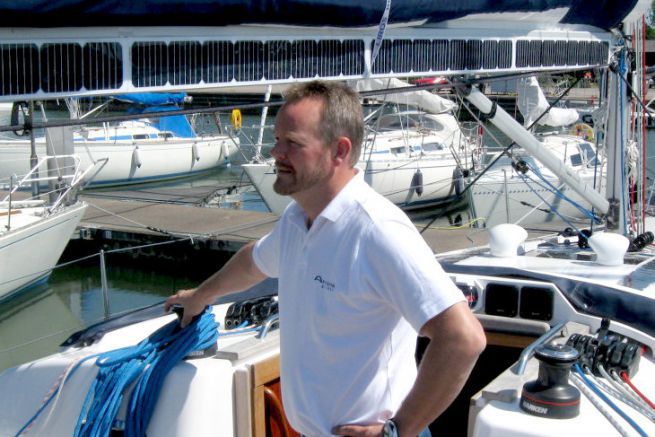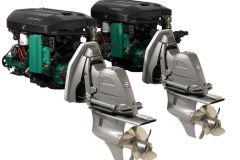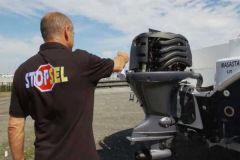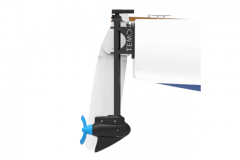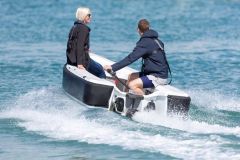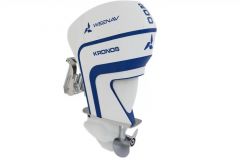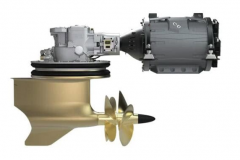For electric propulsion systems, batteries are the lifeblood. With the development of electric vehicles, whether boats or cars, technologies are evolving rapidly. So we wanted to talk to a specialist to better understand the challenges. Christian Hallberg, Oceanvolt's sales manager, was kind enough to answer our questions.
BI: To begin with, can you remind us of the first steps of the electric motor in the marine industry and the problems encountered?
CH : In 2009, the first Lagoon 420 electric catamarans are equipped with lead-acid batteries. This technology, if it works, has several important disadvantages, which have been a brake on the development of electric pleasure boats.
The acceptable discharge rate for a lead-acid battery should not exceed 50 to 60%. In order to ensure a good autonomy, the battery park must therefore be very important, which leads to a high on-board weight. A good part of the engine power is then used to carry the batteries. This technology is acceptable on heavy river shuttles as it has been operating for years, but not on pleasure boats. On the first electric catamarans, the necessary power was underestimated, which led to the use of the equipment above its capacity, at the risk of degrading it.
Lead-acid batteries do not allow temperature monitoring. The risk of overheating which would deteriorate the battery is not controlled. The boat can therefore suddenly find itself without propulsion without this having been anticipated.
Finally, the limitation to a low DC voltage leads to high amperages. This increases the risk of overheating and stressing the batteries.
BI: What did the arrival of Lithium-Phosphate batteries bring in technical terms?
CH : The new Lithium-Phosphate technology has brought two major advances, in terms of weight and safety. For an equivalent capacity, a Lithium-Phosphate battery is 4 times lighter than a lead-acid battery. The absence of reactive components makes it the safest technology. If other solutions such as NMC batteries (Nickel Magnesium Cobalt) have a higher energy density, they are more reactive and require liquid cooling, which is complex to install.
When sizing a battery, the acceptable charge and discharge current must be considered. The battery must be able to withstand a high load over a short period of time, e.g. during port maneuvers at full power. Thanks to lithium phosphate, this permissible discharge current is 10 times higher than that of lead-acid batteries, which makes it possible to reduce the battery stock. In addition, since the charge current is generally estimated to be half of the discharge current, the recharging time is shorter for Lithium-Phosphate batteries.
From a usage perspective, safety has also increased. You have to be careful what type of BMS (Battery Management System) you use, because it's a bit of a jungle out there. With existing active systems, it is now possible to monitor the parameters of the cells separately and react to automatically isolate a defective cell. The other cells continue to function and the boat remains maneuverable.
BI: From an economic point of view, electric propulsion remains expensive. Do you think that the automotive market can help yachting?
CH : The price of Lithium-Phosphate batteries is still high. We are currently at 950 euros / kWh. Storage today represents half the investment in an electric propulsion system for a boat. The explosion of the electric car market will help to lower this price, even if the technologies will not always be the same in the short term. For safety reasons in the marine environment, voltage limitation is a big technical difference.
Beyond the economic aspect, the R&D carried out in the automotive industry will help batteries to become more ecological, as they are far from being green for the moment...
In the end, there will necessarily be a convergence. The best batteries for cars will also be those for boats.
BI: How do you see the future for electric propulsion in the nautical industry and for Oceanvolt?
CH : The main technical issues remain weight and voltage limitation.
In the boating industry, as in the automotive industry, things are evolving faster than analysts predict. Within 5 years, I think we should have gained 50% on both the price and the weight of the batteries. Hybrid and all-electric should be the basic proposition for the majority of sailboats. Then, as soon as an efficient fuel cell allows it, we will do without diesel engines.
As far as Oceanvolt is concerned, we are a driving force in this movement. We are already working with several of the largest yacht builders, in France and abroad, to offer our electric motors as a basic package.

 /
/ 